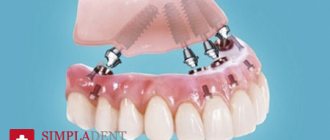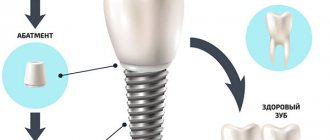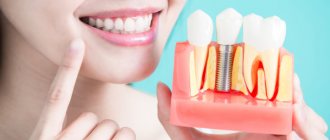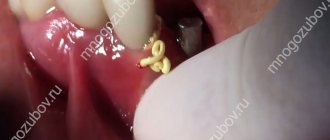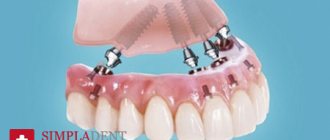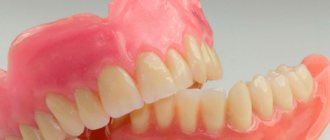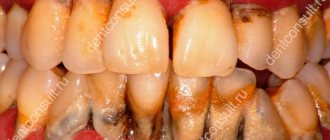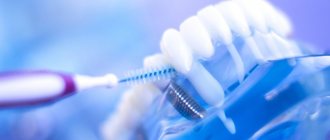Single-stage dental implantation is the implantation of a titanium root into the bone immediately after the removal of your tooth. In this case, bone augmentation is not required (as with the classical scheme), since after the removal of one’s tooth, the volume of hard tissue is quite sufficient. The procedure for implanting a titanium pin is performed in one visit to the dentist, but the patient will still have to visit the office several times: for diagnostics, replacing the temporary crown with a permanent one, and monitoring the healing process.
What is single-stage implantation?
Among the wide range of implantation services, one-step dental restoration procedure is becoming increasingly popular.
It involves installing a dental implant into the socket of a newly extracted tooth. This means that the prerequisite for the procedure is the presence of the tooth, followed by tooth extraction and implant placement in one visit. Operation
Medium difficulty
There are contraindications
Doctor's qualifications
High
Differences from the classical method
Simultaneous implantation allows you to combine two operations: removal and installation of the implant. This reduces treatment time, makes it possible to immediately receive a temporary prosthesis and restore the integrity of the dentition.
Thanks to a simpler algorithm, such treatment is cheaper; you can find prices for services at the Saint-Dent Clinic in the price list.
It is important to know! The cost of treatment is calculated individually, based on the characteristics of each patient’s situation.
What methods of immediate implantation exist?
Representing the installation of a titanium implant into the gum bone tissue, implantation into the socket of an extracted tooth can be of two types:
- After the tooth is removed, an implant is installed, around which the gum tissue is sutured. Subsequent manipulations, namely the installation of an abutment and crown, are performed only after complete healing of the gums and osseointegration of the implant (according to the classic protocol).
- After removal, a monoblock implant is installed, on which a crown is placed.
Work examples
How often do you visit the dentist?
Advantages of the method
The method has proven itself not only with a lower price and speed of treatment, but also with the following advantages.
- Installing a temporary crown allows you to preserve the natural contour of the soft tissues.
- High physiological and psychological comfort: all manipulations are performed in one visit.
- Possibility of preserving bone tissue.
- The method is highly physiological: the implant is installed exactly in the location where the tooth used to be, which ensures normal load distribution.
What are the contraindications to immediate dental implantation?
Despite the popularity of this method of restoring dental aesthetics and functionality, there are a number of reasons why single-stage implantation is impossible.
- Missing tooth. Regardless of whether the tooth was removed two years ago or two weeks ago, it will be impossible to carry out immediate implantation. Only a fresh socket of a barely extracted tooth is suitable for installing a titanium “root”.
- Inflammation of the gum tissue in the area of the tooth that will be removed. The inflammatory process is likely to cause implant failure in the future. In this situation, after removal, complete healing of the hole is necessary and only then can the implant be installed.
- Uncompensated diabetes mellitus.
- Bruxism (teeth grinding that a person cannot control during sleep).
- The period of exacerbation of chronic diseases.
- Heavy smoking.
- Alcoholism.
- Nervous disorders.
There are cases when immediate installation of a dental implant is possible, but immediate loading with a crown is contraindicated. An example is a too traumatic tooth extraction procedure and severe damage to soft tissues.
It is important that an experienced doctor decides on the possibility of installing a crown directly on the implant. This possibility is due to the good condition of the oral cavity, the absence of any problems - carious lesions, problems with the gums, etc. Otherwise, there is a risk of rejection of the “root”. Thus, the accumulation of plaque around injured and unsutured gum tissue is the reason for the occurrence of reimplantitis (inflammation of the bone tissue around a metal implant).
Possible complications
Simultaneous removal and implantation of teeth has risks associated with implant rejection. Their occurrence is possible in the following cases:
- weak immunity of the patient;
- severe bruxism;
- smoking tobacco;
- systemic diseases during exacerbation.
The individual approach to treatment practiced by the Saint-Dent Clinic allows us to prevent and minimize possible complications.
How is one-stage implantation performed?
The algorithm for performing one-stage dental implantation is as follows:
- An examination of the condition of the oral cavity is carried out. If any problems are identified - carious lesions or inflamed areas of the gums - it is necessary to carry out appropriate treatment.
- Hygienic teeth cleaning is carried out.
- The tooth is removed.
- The hole is cleaned and treated with special compounds.
- The implant is installed.
- If necessary, special bone material is used to increase the strength of implant fixation.
- According to the doctor's decision, an abutment or temporary crown is installed.
All these stages are “fitted” into one dental visit. After which the patient will have to take full responsibility for the healing process and compliance with the rules of the rehabilitation period.
Postoperative period
After installation of the implant, swelling and a slight increase in temperature may be observed. Doctors recommend observing the following conditions.
- Avoid chewing load.
- Do not consume hot food or drinks.
- Carefully monitor oral hygiene.
- Reduce physical activity and avoid stress.
- Avoid traveling by plane.
- Eliminate alcohol and tobacco.
Where to go for treatment
Implantation immediately after tooth extraction has become a common option today to solve the problem. The implant is placed in place of the tooth during the same visit as the extraction. Relatively often, the missing bone around the implant (which, as a rule, is narrower than the root of a natural tooth) must be supplemented with a special biomaterial. In case of extensive bone damage caused by inflammatory processes in the teeth, such treatment is not always possible.
In everyday dental practice, doctors are often faced with the need for removal, including in emergency cases. The method of immediate implantation and, if possible, immediate loading should then be chosen. If, of course, all the requirements are met - there is enough bone tissue, the bone is not too damaged during tooth extraction, etc. Of course, modern dentistry provides other opportunities to help the patient restore extracted teeth. Nevertheless, implantation has many advantages - the highest aesthetic effect and improvement in the patient’s quality of life.
Consult the best specialists in implantology in the capital about dental restoration using a one-step protocol.
| Clinic address | Clinic | Price |
| Dentistry ROOTT |
|
| Moscow, Kolpachny lane, 6, building 4. | Dentistry Sandora |
|
| Dentistry Prosmail.RU |
|
| Moscow, metro station "Butyrskaya", Rustaveli Street, building 15 | Dental Clinic Dention |
|
| Moscow, metro station Barrikadnaya st. Zoologicheskaya, 2, under. 9 | Dentistry DENTAL DREAM |
|
| Moscow, Zvenigorodskoye sh., 7 | Dentistry Implant Expert | Nobel implantation, USA, from 50,000 rubles, Astra Tech implantation, Sweden from 47,200 rubles, OSSTEM Korea - 27,000 rubles |
| Moscow, Bolshoi Sergievsky lane, 5 | Dentistry Viva-dent | Dental implantation depending on complexity: 31,000 - 41,000 rubles per 1 tooth |
| Moscow, st. Molodtsova, 2a | Family discount dentistry | Implantation is carried out using various systems - Astra Tech (Sweden), Ankylos Densply (Germany), Dentium (Korea), the price for 1 restored tooth is from 30,000 rubles. |
| Moscow, Paveletskaya sq., 1 | Dental Clinic Denta VIP | Implantation of the IMPLA system (Germany), OSSTEM (Korea) - from 36,000 rubles. Astra Tech (Sweden) – from 45,000 rubles. |
| Moscow, st. Lyublinskaya, 161 | Dentistry PRESIDENT |
|
FAQ
1. Is there an alternative to classic one-step implantation? Basal implantation, All-on-4, All-on-6.
2. Are single-stage and basal implantation the same thing? No, these are different methods for quickly restoring dentition, and the indications for their implementation are also different. Single-stage dental implantation is an effective express method that allows you to quickly restore a lost tooth without causing damage to the jaw bone tissue.
Literature:
- Ivanov, A. S. Fundamentals of dental implantology / A. S. Ivanov. – Moscow: SpetsLit, 2011. – 765 p.
- Musheev I.U., Olesova V.N., Framovich O.Z. Practical dental implantology: Guide. - M.: Locus Standi, 2008. - 498 p.
- Jang HW, Kang JK, Lee K, et al. A retrospective study on related factors affecting the survival rate of dental implants. Prosthodont. 2011; 3 (4): 204–215.
- Weiss Ch.M., Weiss A. Principles and practice of Implant Dentistry - St. Louis: Mosby, 2001.
Moscow metro station Zvezdnaya, Danube Avenue, 23
